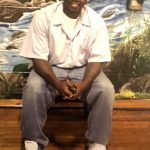In a remote prison in rural Virginia, I watch an elderly man deteriorate before my eyes. I don’t know his name, much less why he is sick, but soon enough, the penitentiary grapevine whispers along that dreadful word: cancer. When I learn this, I close my eyes and pray, because in prison, a cancer diagnosis might as well be a death sentence.
For the longest time, I don’t have the heart to speak to him or ask what I can do to help. It feels wrong. Like, Hey, my name is Tut. I have some Oreos and instant ramen noodles. Maybe that’ll ease your battle with lymphoma. Before I learned of his diagnosis, the elderly man and I had simply coexisted, occasionally sharing common spaces. He was always pleasant with the older men he strolled around the facility with. Now, I said hello when we passed by each other, and he responded with a brief nod.
The image would not leave my mind: a man with cancer, dying in a state-issued uniform, his memory forgotten. The men of Nottoway Correctional Center would speak on his passing. He would be the topic of discussion for a while, until something good on TV caught their attention. Or a fight broke out. Or a commissary delivery arrived.
I too am an incarcerated man with more time remaining in my sentence than is humanly possible—the cancer of my existence. This seemed to be our penance, the both of us: to suffer a thousand deaths daily. We walked—or limped—alone with our crimes, haunted by those we had wronged.
From one of the man’s walking buddies, I eventually learned his name—Michael Cross—and a little more of his story. Mr. Cross had been incarcerated since August 29, 1974—longer than I had been alive.
As the days and nights slipped into the ether, I tried not to think about him. I sat with my back to Mr. Cross in the chow hall, so that I didn’t have to watch him stagger to his usual seat after chemotherapy, or bow his head in prayer before reaching for his plastic spork. If I didn’t see him, I could just forget. I could get him out of my mind. I could get me out of my mind: a fellow lifer who was blindfolded, told to wander each day into the unknown.
But it was impossible to forget that each step I took detached me from the free world.
Mr. Cross and I walked past each other regularly now, not only in the chow hall but also when I performed my in-grounds duties: mowing lawns and managing trash around the facility. Each time we did, I noticed his weight loss. His face was becoming skeletal, his gait slower and slower. I still said hello, and he still nodded back.
One afternoon, I watched Mr. Cross use the facility’s fencing like a walker to hold himself up as he edged past building after building, staggering slowly to his job in the gymnasium at the far end of our massive facility. The men on the sidewalk, as usual, passed by him without a glance. I peered at the sky, wondering how I should proceed.
As I walked by him, I thought to myself: He was me before I was me. Finally, I turned and chased him down by the chow hall. “Can I help you?” I asked, offering my arm to him. Mr. Cross peered at me, then at my arm. He smiled, but refused. “Fine,” I said, “but can I walk with you?” He nodded, and we headed toward the academic buildings together.
We parted ways wordlessly. After, I headed back to my housing unit feeling like I had done something important. I didn’t know if our interaction eased his day, but it had eased mine. I’m supposed to be this incarcerated man who has accepted utter defeat. But Mr. Cross reminded me that I shouldn’t walk around blind. Even behind bars, there was life to miss out on.
Mr. Cross helped me begin thinking more deeply about my existence in the colorless world known as prison. My experience has been that, in this world, nobody will let on that they give a damn about anybody else. That was once my reality too, as I waited for my day to escape this existence. But no longer. I couldn’t do what I saw others do to the elderly. I couldn’t walk around like Mr. Cross was nobody. I couldn’t, and I won’t.
As the day closed, I rested on my bunk, thinking about Mr. Cross. I saw his smile. It was the smile of a man battling through another day. The kind of smile you receive when you’ve done something good. It warmed my spirit as I drifted off into my dreams.
The next morning, I headed down to chow. From behind me, I heard, “Hello.” I turned and found Mr. Cross holding the fence.
“Hello to you,” I smiled. “How are you doing today?”
“As best as I can.”
“Can I help you with anything?”
“You can walk with me to the gym.”
This time, we didn’t walk past each other. Instead, we walked together.
More from our decarceral brainstorm
Inquest, finalist for the 2025 National Magazine Award for General Excellence, brings you insights from the people working to create a world without mass incarceration.
Sign up for our newsletter to get the latest in your inbox every Saturday.

